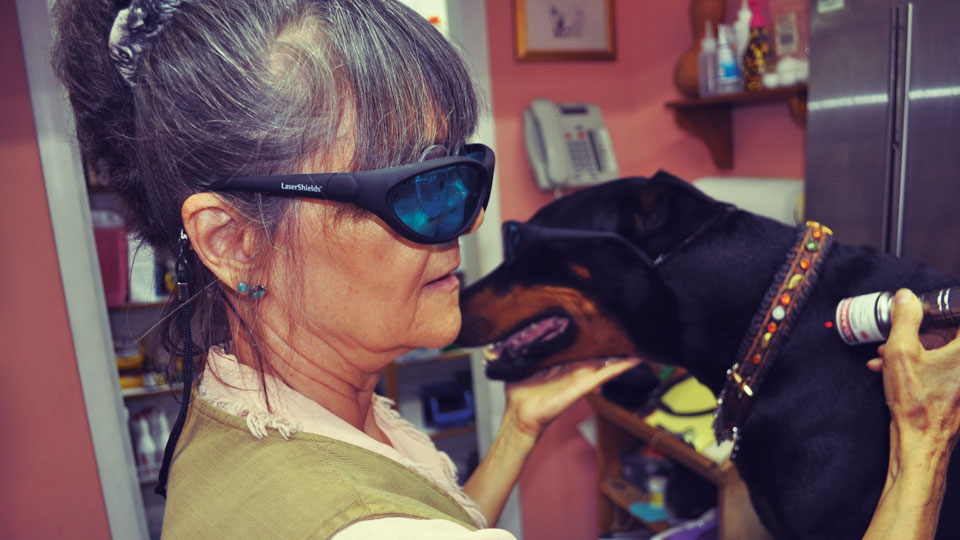It’s about 20 minutes until Dr. Sabra Saint Germain’s next appointment in her veterinary office in the back of the Barkstown Road pet supply store on Frankfort Avenue, and she’s sitting at a desk, looking through her glasses at a laptop screen, her long, curly gray hair pulled back, one coil of bangs a lighter color, not quite as white as her lab coat. Half the room looks like incense could be burning — blankets over tables, Oriental rugs — the other side more clinical, with a height-adjustable metal exam table attached to the wall. Beside Saint Germain, a young woman perches on a tiny, tasseled stool, balancing on her knees a keyboard attached to the laptop.
“OK, this dog has metastasized nasal carcinoma,” Saint Germain says. “And they did say that they’re seeing a couple spots in her lungs now.” The assistant types at the keyboard as Saint Germain lists the dog’s medications, some of which, like Piroxicam, sound strange, the way all medicines do. But some sound odder. Like “mushroom defense.”
“There’s mushrooms that are thought to have enhancing properties,” Saint Germain says. “Briar rose? I don’t know what that does. Briar rose. Do you?” she asks the room. The dog’s on cannabidiol, a cannabis derivative. “A lot of clients start that on their own; I’m not allowed to talk about it,” Saint Germain says. And then there’s the ozone. Which the dog’s owner has been putting up its butt like she’s filling a doggy balloon. “When you put ozone in the colon, it immediately goes across the colon into the blood, and it helps clear out the liver of problems,” Saint Germain explains. “However, the dog was getting rectal irritation, so she had to quit doing it every other day, or she had to do it less often cause of the rectal irritation.”
Saint Germain really believes in the power of ozone. Earlier, she claimed that people had cured brain cancer with it. She’s tried it on herself, putting a cup attached to a gas tank over her ear to insufflate her head. Once, when she had bronchitis, she tried inhaling it. Saint Germain makes a dramatic gasping sound. “Fuhgeddaboudit,” she says. “Oh, no, no, you cannot stand it.”
Saint Germain is an holistic vet, who treats animals with non-Western healing practices. She has a degree in zoology and has practiced Western medicine, but this is her calling. Her patient, a fluffy little Yorkie-Pomeranian mix graying around the muzzle, comes in, and Saint Germain coos at her. The owner sees several vets, including one in Cincinnati who has been giving her dog stereotactic radiation to the tune of, she estimates, $10,000 to $12,000. She wanted to stick to “natural” remedies, and went to Saint Germain first, but when the cancer progressed, she looked for other options. “I think it bought her some time,” Saint Germain says. She dangles over her palm a pendant she took from what looked like a Tibetan singing bowl. “I used to do it over the animals, but they would get so freaked out, and they were jumping all over, and I couldn’t really figure out what was going on,” she told me earlier. The pendulum tells Saint Germain that the dog’s first chakra, the “survival one,” she says, is strong. “I don’t like to see it real dim, cause, you know, that means they don’t want to live too much.”
Confused? “Chakras are little tornadoes of energy that go through the body,” Saint Germain says, nodding at the drawing of a dog taped up by the table, colors and squiggles swirling through its body. The second chakra, and therefore the immune system, is normal. But the dog’s third chakra is “a little bit low.” Saint Germain takes out a purplish crystal she recently bought at a psychic fair and waves it counterclockwise over the dog, “against” the clockwise-turning chakra, blowing air out of her mouth with each revolution — foo! foo! foo! — and then slinging the crystal toward the floor like she’s shaking out something wet, casting out negative energy with a witchoo! “Anybody can do this; it’s not special to me,” she says, still waving the crystal — foo! foo! foo! — “although I think because I’m a veterinarian, I probably am a little bit stronger.” She has her assistant mark down the patient’s chakra levels in a chart.
Saint Germain has been doing acupuncture for more than 30 years, and she deftly wraps a blue cord around the dog to stable her, removes yellow-tipped needles from plastic packages and inserts them down either side of the dog’s spine, a couple under her haunches, one or two in her paws. The dog doesn’t complain as they go in, but after a few minutes, she lets out a single yow!, perhaps from boredom. “Oh, yes, we’re going to get those needles out, hang on,” Saint Germain says. Since the dog has cancer, Saint Germain does not use her cold light laser to “stimulate cells to produce oxygen.”
The pendulum determines what homeopathic medicines the dog needs, swinging over Saint Germain’s hand as she lists anatomy. It comes down a different way when she says “gallbladder,” indicating a problem. She takes four little brown bottles from a box. What's in them? “A billion herbs that I don’t know anything about,” Saint Germain says. “They’re diluted. They’re so diluted this is probably mostly water.” The dosage isn’t so important to her. “Homeopathics work by energy, not by volume, so you just have to take a little bit under your tongue or something to get the energy of it,” she says. “Some people just feel this is all poppycock. But I’ve seen it make a difference. The thing I like about it is not so much the treatments of these things, but it helps me find problems, little problems, before they become big ones. Like, she’s got a gallbladder problem. How would we know that? She’s not showing any signs of it.”
This originally appeared in the November 2017 issue of Louisville Magazine. To subscribe to Louisville Magazine, click here. To find us on newsstands, click here.



